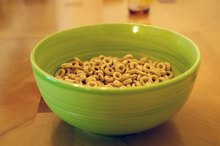What does fact checked mean?
At Healthfully, we strive to deliver objective content that is accurate and up-to-date. Our team periodically reviews articles in order to ensure content quality. The sources cited below consist of evidence from peer-reviewed journals, prominent medical organizations, academic associations, and government data.
- MedlinePlus: Niacin and Niacinamide (Vitamin B3)
- National Institutes of Health: NIH Halts Clinical Trial on Combination Cholesterol Treatment; May 26, 2011
The information contained on this site is for informational purposes only, and should not be used as a substitute for the advice of a professional health care provider. Please check with the appropriate physician regarding health questions and concerns. Although we strive to deliver accurate and up-to-date information, no guarantee to that effect is made.
Can Niacin Cause Gout?
Niacin, or vitamin B3, occurs naturally in a variety of foods, including tuna and peanuts 2. You can also take niacin supplements, by prescription or over the counter, to treat conditions such as high cholesterol, arthritis and atherosclerosis (hardening of the arteries). Niacin in your diet will unlikely cause side effects. But if you take niacin supplements in large quantities, side effects, including gout, may occur.
If you are experiencing serious medical symptoms, seek emergency treatment immediately.
Gout
Gout often develops without warning. You might awaken in the middle of the night with intense pain in your big toe or in other joints in your feet, hands, ankles, knees and wrists. Severe joint pain can last up to a day and lesser discomfort for days or weeks. If you suffer gout once, you are susceptible to future, more severe attacks. Untreated, gout can lead to joint damage, so see a doctor as soon as possible.
- Gout often develops without warning.
- If you suffer gout once, you are susceptible to future, more severe attacks.
Causes
The Link Between Niacin, Liver Damage & Alcohol
Learn More
An accumulation of uric acid in your blood causes gout. Urate crystals form around a joint or joints, causing inflammation and intense pain. Persons who drink too much alcohol – more than one drink a day for women, two for men – put themselves at risk for gout. Untreated high blood pressure and chronic conditions such as diabetes also make you more susceptible. Niacin helps treat two conditions that can cause gout – excess cholesterol in your bloodstream and narrowed arteries. But when you take niacin in large quantities – more than 100 mg a day – it can turn toxic. Your kidneys, while working to rid your body of niacin, may fail to excrete uric acid, leading to gout.
- An accumulation of uric acid in your blood causes gout.
- Your kidneys, while working to rid your body of niacin, may fail to excrete uric acid, leading to gout.
Niacin and Gout
Niacin commonly causes skin flushes, a condition that makes your face and chest redden, itch, tingle and burn. Skin flushes, uncomfortable but not serious, give you an early warning sign of toxicity. If you lower your dose of niacin and gradually increase it, you may alleviate skin flushes. If your body, including your kidneys, can slowly adjust to higher amounts of niacin in your system, you may prevent gout. Other serious side effects of taking niacin include stomach ulcers and liver damage. The National Institutes of Health halted a niacin study in May 2011, 18 months earlier than planned, after participants who took 2,000 mg of niacin daily suffered twice as many strokes as study participants who did not take niacin.
- Niacin commonly causes skin flushes, a condition that makes your face and chest redden, itch, tingle and burn.
- If you lower your dose of niacin and gradually increase it, you may alleviate skin flushes.
Considerations
Niacin and Impotence
Learn More
Other medications, including low-dose aspirin and drugs given to prevent the rejection of organ transplants, can cause gout. If you take thiazide diuretics to lower your blood pressure, you increase your chances of sustaining a gout attack. Some foods in your diet, including asparagus and herring, can lead to uric acid buildup and gout. A doctor can treat gout with pain relief and anti-inflammatory medication and prescribe medications to help prevent recurrences. If niacin causes gout or other side effects, ask your doctor about switching to a different medication.
- Other medications, including low-dose aspirin and drugs given to prevent the rejection of organ transplants, can cause gout.
Related Articles
References
- University of Maryland Medical Center; Vitamin B 3 (Niacin); June 18, 2009
- MedlinePlus: Niacin and Niacinamide (Vitamin B3)
- National Institutes of Health: NIH Halts Clinical Trial on Combination Cholesterol Treatment; May 26, 2011
- National Institutes of Medicine Office of Dietary Supplements. Niacin Fact Sheet for Health Professionals. Updated June 3, 2020.
- MedlinePlus. Niacin. Updated June 4, 2020.
- Boden WE, Probstfield JL, Anderson T, et al. Niacin in Patients with Low HDL Cholesterol Levels Receiving Intensive Statin Therapy. N Engl J Med. 2011;365(24):2255-2267. doi:10.1056/NEJMoa1107579
- Morris MC, Evans DA, Bienias JL, et al. Dietary niacin and the risk of incident Alzheimer's disease and of cognitive decline. J Neurol Neurosurg Psychiatry. 2004;75(8):1093-1099. doi:10.1136/jnnp.2003.025858
- Elam MB, Hunninghake DB, Davis KB, et al. Effect of Niacin on Lipid and Lipoprotein Levels and Glycemic Control in Patients With Diabetes and Peripheral Arterial Disease: The ADMIT Study: A Randomized Trial. JAMA. 2000;284(10):1263-1270. doi:10.1001/jama.284.10.1263
- Zhai G. Alteration of Metabolic Pathways in Osteoarthritis. Metabolites. 2019;9(1):11. doi:10.3390/metabo9010011
Writer Bio
Kathryn Gilhuly is a wellness coach based in San Diego. She helps doctors, nurses and other professionals implement lifestyle changes that focus on a healthy diet and exercise. Gilhuly holds a Master of Science in health, nutrition and exercise from North Dakota State University.









